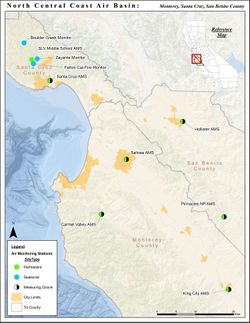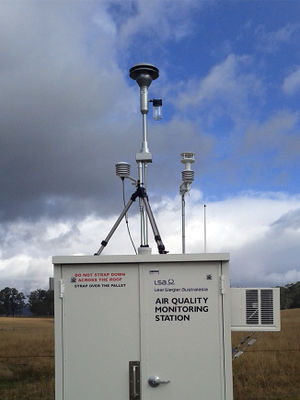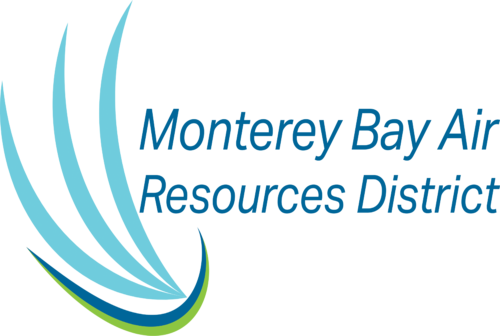Monterey Bay Air Resources District
Contents
Overview
The Monterey Bay Air Resources District (MBARD) is a regional regulatory agency that oversees the monitoring and management of air quality issues across Monterey, San Benito, and Santa Cruz Counties in California's Central Coast region. This tri-county area forms what is known as the North Central Coast Air Basin. MBARD is one of 35 regional air districts (sometimes referred to as air quality management districts or air pollution control districts) who report to the California Air Resources Board. [1]
Mission
MBARD aims to balance air quality issues with the region's economic drivers while simultaneously protecting both public and environmental health. [1]
Management Responsibilities
MBARD is tasked with a wide range of responsibilities that include[2]:
- Air quality monitoring
- Permitting
- Source testing
- Enforcement
- Long-range air quality planning
- Regulatory development
- Education and public outreach
Organizational Structure
Executive
Comprised of the Air Pollution Control Officer position (currently held by Richard Stedman), the executive division of MBARD oversees the coordination, direction, and management of the district's functions to promote healthy air quality across the jurisdiction. This branch is also responsible for guiding policies such as district rules and long-range air quality planning strategies. The division maintains a working relationship with state and federal agencies which supports policy guidance at both the state and national levels. [3]
Administrative
Board of Directors
MBARD is governed by a board of directors consisting of 11 members.
- Steve McShane (Chair) - City of Salinas
- Ryan Coonerty (Vice Chair) - Santa Cruz County
- Anthony Botelho - San Benito County
- Mary Ann Carbone - Monterey Peninsula cities
- Zach Friend - Santa Cruz County
- Fred Ledesma - Cities of southern Monterey County
- Christopher Lopex - Monterey County
- Jane Parker - Monterey County
- John Phillips - Monterey County
- Honor Spencer - Cities of San Benito County
- Vacant
Budget, Personnel, and Nominating Committee
This committee assists with the establishment of MBARD's annual budget and recommends staffing levels. It is comprised of five members of the board of directors.[5]
Advisory Committee
MBARD's Advisory Committee reviews technical, social, environmental, and fiscal impacts of meeting agenda items that are set to go before the board of directors at future meetings. The committee then makes recommendations to the board of directors. Committee members are appointed by the board of directors. Each board member is allowed to appoint two members to the Advisory Committee. Committee members typically have extensive professional experience in their fields or represent local interest groups of the community.[5]
Compliance Division
The Compliance Division is responsible for inspections and investigations of air pollution sources. The Compliance Division upholds MBARD's rules and develops/implements enforcement procedures. This division reviews proposed district rules and make recommendations regarding their enforceability.[7]
Engineering Division
MBARD's Engineering Division upholds the responsibility of issuing or denying permits to construct or operate facilities or equipment that contribute to the degradation of air quality. The Engineering Division continually monitors stationary sources of air pollutants and makes recommendations to both the Air Pollution Control Officer and industrial representatives regarding how emissions can be reduced. Furthermore, it evaluates the district's rules and makes recommendations for improvement.[3] [8]
Planning Division
The Planning Division upholds the responsibility of developing long-range air quality improvement plans. The Planning Division oversees grant programs and their administration. This division also ensures that the district's rules, grant programs, and other activities are compliant with the California Environmental Quality Act. [3] [4]
Air Monitoring Division
MBARD's Air Monitoring Division is responsible for reporting air quality conditions to the public.[3] This includes making current air quality forecasts and issuing air quality advisories during periods of variable and unpredictable air quality, such as during wildfires[9] and the COVID-19 pandemic.[10] The Air Monitoring Division maintains seven permanent air sampling stations and ensures their effective installation, repair, calibration, and modification. This division conducts primary data analysis on air quality data and is required to report regional air quality conditions, statistics, and division activities to the California Air Resources Board every month. As needed, the division also carries out special air monitoring and meteorologic projects where temporary air sampling stations are deployed. Temporary sampling stations monitor conditions around events that may impact public health such as large structural fires, prescribed fire, or wildfire. [3]
Central Coast Issues
Ozone
A primary issue of concern for MBARD is ozone (O3). More commonly known as smog, ozone forms when volatile organic compounds, such as oxides of nitrogen, react with sunlight. MBARD's jurisdiction is considered a non-attainment region for the California Ambient Air Quality Standards (CAAQS) regarding ozone. "Non-attainment" refers to a region that is unable to meet the statutory requirements of CAAQS. The formation of ozone in MBARD's jurisdiction is primarily attributed to two sources; (1) nitrous oxide emissions from mobile vehicles and (2) downwind movement of pollutants from the San Francisco Bay Area and San Joaquin Valley. Because emissions from mobile vehicles are regulated by the California Air Resources Board, MBARD continues to encourage mobile source emission reduction through its grant programs. [11]
Open Outdoor Fire
Recent Litigation
Required registration of diesel engines
Jensen Family Farms, Inc. v. Monterey Bay Unified Air Pollution Control District (2011)
In 2004 the California Air Resources Board adopted a regulation aimed at controlling toxic emissions from diesel vehicles. This rule change stipulated that local air pollution control districts are responsible for controlling these same toxic emissions from non-motor vehicles. In 2007, MBARD adopted a regulation requiring that any diesel engine greater than 50 horsepower be registered with the district and that the engine owner pay a fee. Jensen Family Farms decided to sue MBARD because they believed that rule was already in place under the Federal Clean Air Act. The plaintiff also believed that MBARD was in violation of California law and that the 2007 rule change violated their right to constitutional due process. However, a trial court found that the rule change was not covered by the Federal Clean Air Act because it only sought to gather fees and registration information. The court also ruled that the defendant's due process had not been violated because MBARD had a rational basis for adopting the legislation. [12]
Requirement to inspect for asbestos prior to demolition
Monterey Bay Air Resources District v. Equity LifeStyle Properties, Inc. (2018)
In late 2017, MBARD received a complaint about dust emissions from the De Anza manufactured home park located in the City of Santa Cruz. MBARD's investigation revealed that Equity LifeStyle Properties (ELS) had not thoroughly checked the facilities for asbestos prior to demolition or notified MBARD of the demolition as required by the rules of the district. Further investigation revealed the same practice by ELS at various other facilities around the state. When the case was finally brought to court, ELS was amicable and responded by quickly changing its company policies relating to demolition at all California sites. ELS agreed to pay a total of $1.5 million, where $1 million covered civil penalties, $250,000 for court costs, and another $250,000 for a supplemental environmental project. The supplemental environmental project devoted to installing solar photovoltaic systems at ELS properties. [13]
Projects
MBARD operates a variety grant programs to incentivize projects that increase air quality and reduce public health impacts. The funded projects tend to be ones that reduce or eliminate pollution from mobile sources (e.g. cars, marine vessels, agricultural equipment, construction equipment) or projects that encourage the use of low emissions or zero emissions transportation such as vanpools and electric vehicle replacements.[14]
San Lorenzo Valley - Spare the Air Program
MBARD's Spare the Air program aims to reduce the negative public health effects of wood smoke in the San Lorenzo Valley in Santa Cruz County during times of poor air quality. When a Spare the Air alert is active, residents of the San Lorenzo Valley are discouraged from using wood-burning stoves and fireplaces and are encouraged to use alternative heating sources such as natural gas, propane, or pellet stoves.[14]
Electric Vehicle Incentive Program
MBARD's Electric Vehicle Incentive Program provides rebates for purchasers of qualifying electric vehicles. The following list describes the amount of rebate possible based on the type of vehicle purchased [14]:
- New Electric Vehicles (EVs): $1,000. Used EVs: $750
- New Plugin Hybrid EVs (PHEVs): $500. Used PHEVs: $300
- New Electric Motorcycle: $200
- New Hydrogen Fuel Cell Vehicles: $1,500
Carl Moyer Program
Incentivized by Assembly Bill 617 signed by Governor Brown in 2017, the Community Air Protection program aims to reduce the disproportionate impacts from air contaminants to communities of lower socioeconomic status. In response to this legislation, MBARD implemented the Carl Moyer Program. This incentive program provides funding for Desiel Engine/Equipment Replacement replacement for industrial farming operations around the city of Salinas. The program promotes the purchase of farming equipment that reduces diesel emissions and particulate matter. MBARD received additional funding from the California Air Resources Board in 2018 for this program which expands qualifying equipment to include marine vessels, irrigation pump engines, construction equipment, and other mobile agricultural equipment.[14]
Electric School Bus Program
This program provides grant funding for any public school district to support the purchase or lease of fully electric buses. The funding also extends to compressed natural gas buses and supports tank replacement.[14]
Related Links
References
- ↑ 1.0 1.1 MBARD's "About Us" page: https://www.mbard.org/about-us
- ↑ A brochure describing what MBARD does: https://www.mbard.org/files/402e884e5/Final+MBARD+Brochure+05-26-2016.pdf
- ↑ 3.0 3.1 3.2 3.3 3.4 MBARD job descriptions: https://www.mbard.org/job-descriptions
- ↑ 4.0 4.1 MBARD Planning: https://www.mbard.org/air-quality-and-planning
- ↑ 5.0 5.1 5.2 Page describing the Board of Directors and committees https://www.mbard.org/board-of-directors
- ↑ Air monitoring station image: https://350bayarea.org/event/air-district-workshop-community-air-monitoring
- ↑ Synopsis of MBARD's inspection and enforcement procedures: https://www.mbard.org/compliance
- ↑ MBARD Permitting: https://www.mbard.org/authority-to-construct-permit-to-operate
- ↑ MBARD's Wildfire Smoke Information and Resources page https://www.mbard.org/wildfire-smoke-information-and-resources
- ↑ MBARD Air Quality Advisory - COVID-19 https://www.mbard.org/air-quality-advisory-covid-19
- ↑ MBARD's 2012-2015 Air Quality Management Plan: https://www.mbard.org/files/6632732f5/2012-2015-AQMP_FINAL.pdf
- ↑ Synopsis of Jensen Family Farms v MBARD: https://www.informea.org/en/court-decision/jensen-family-farms-inc-v-monterey-bay-unified-air-pollution-control-district-et-al
- ↑ Synopsis of MBARD v ELS: https://regionalassociations.org/1-5-million-settlement-in-environmental-protection-case/
- ↑ 14.0 14.1 14.2 14.3 14.4 MBARD Grant programs: https://www.mbard.org/grants-incentives
Disclaimer
This page may contain student work completed as part of assigned coursework. It may not be accurate. It does not necessary reflect the opinion or policy of CSUMB, its staff, or students.
